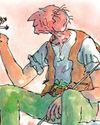
A few years ago - though by now this may as well have happened in another lifetime - I was giving a lecture on DH Lawrence's short story The Blind Man. This was part of an undergraduate course in "Writing Practice and Study" delivered to second-year students who were taking a combination of literature and creative writing modules.
I was using the story as a way of talking to them about what Lawrence called sentences that "lived along the line". "Lawrence is dangerous," I said to the class. "You never know what is going to happen in his fiction. You never know where it might lead." I went on to tell them about how his writing is put together in such a way as to make us have to pay close attention, that otherwise we might miss something or get it wrong.
I told them about how his work also often takes on subjects many people have regarded as challenging. There was Lady Chatterley's Lover, banned for indecency; Lawrence's various tricky interests in a Nietzschean kind of super-man philosophy; his rebellion against social norms and the concept of the status quo.
Lawrence loathed the idea of a status quo, I said, in literature and in life. He was a risk taker. I outlined his wonderful treatment of male intimacy in The Blind Man by way of example: how the reader is never quite sure just what the two men in the story are going to do to each other, the way Lawrence questions ideas about vulnerability and the frailty of our bodies and relationships.
I hadn't even got on to the extraordinary part - where Maurice, the young husband, blinded in World War I, having met the man his wife knew in a former life, asks, because he cannot see him, if he may touch his face when a young woman put up her hand and called out, "Excuse me, but I think it's inappropriate that you are lecturing on a story about someone with a disability."
Esta historia es de la edición July 6-12 2024 de New Zealand Listener.
Comience su prueba gratuita de Magzter GOLD de 7 días para acceder a miles de historias premium seleccionadas y a más de 9,000 revistas y periódicos.
Ya eres suscriptor ? Conectar
Esta historia es de la edición July 6-12 2024 de New Zealand Listener.
Comience su prueba gratuita de Magzter GOLD de 7 días para acceder a miles de historias premium seleccionadas y a más de 9,000 revistas y periódicos.
Ya eres suscriptor? Conectar

Sights to behold
Being blind didn't deter Aucklander FRASER ALEXANDER and his partially-sighted wife from travelling in Europe. Their memories were shaped by sound, touch and smell.

Pages of delight
Charming survey of children's literature throughout the centuries should be treasured and reread.

Heart of the matter
Women are less likely to be diagnosed with heart disease than men, and less likely to get best treatment. Researchers are struggling with old stereotypes to right the balance.

Balaclava beats
Their paramilitary shtick is intentionally menacing, offensive and alienating, but to be fair to the hip-hop trio Kneecap, their infamous balaclava is disarmingly hilarious. Kneecap, the 2024 movie that offers a fictionalised account of their rise to fame, is a Bafta- and Oscar-nominated Northern Irish film sensation.

Friends like these
One of the stranger characteristics of the populist oligarchy mobilising around Donald Trump's new administration is the interest taken in the domestic politics of the UK.

Irresistible force
A new documentary about gentle rugby giant Jonah Lomu reveals little but is a reminder of what made him special.

Fleeing the nest
A tale of building a new life after an abusive relationship makes for an impressive debut.

Life less ordinary
Chelsie Preston Crayford follows a big 2024 with a new comedy role and putting the finishing touches on her debut feature as a director and writer.

Not on our watch
Nasa, one of the most technologically advanced organisations on the planet, made prospective astronauts take inkblot tests to determine their sexuality.

No free lunch
The new, cut-price school lunch programme will shut out many community providers. But will bulk-supplied meals meet children’s needs?